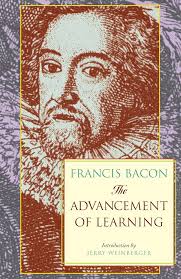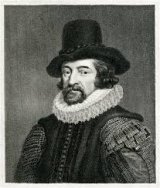The Advancement of Learning Page #14
The Advancement of Learning, published by Francis Bacon in 1605, is a foundational text in the history of science and philosophy. In this work, Bacon advocates for empirical research and the systematic organization of knowledge, laying the groundwork for the scientific method. The book critiques existing scholarly practices and proposes a new approach to learning based on observation and experimentation. It marks a significant shift towards modern scientific inquiry.
- Year:
- 1605
- 1,171 Views
Submitted by acronimous on August 11, 2024
Modified by acronimous on August 11, 2024
shop. The other, because they minister a singular help and preservative against unbelief and error. For our Saviour saith, “You err, not knowing the Scriptures, nor the power of God;” laying before us two books or volumes to study, if we will be secured from error: first the Scriptures, revealing the will of God, and then the creatures expressing His power; whereof the latter is a key unto the former: not only opening our understanding to conceive the true sense of the Scriptures by the general notions of reason and rules of speech, but chiefly opening our belief, in drawing us into a due meditation of the omnipotency of God, which is chiefly signed and engraven upon His works. Thus much therefore for divine testimony and evidence concerning the true dignity and value of learning. VII. (1) As for human proofs, it is so large a field, as in a discourse of this nature and brevity it is fit rather to use choice of those things which we shall produce, than to embrace the variety of them. First, therefore, in the degrees of human honour amongst the heathen, it was the highest to obtain to a veneration and adoration as a God. This unto the Christians is as the forbidden fruit. But we speak now separately of human testimony, according to which—that which the Grecians call apotheosis, and the Latins relatio inter divos—was the supreme honour which man could attribute unto man, specially when it was given, not by a formal decree or act of state (as it was used among the Roman Emperors), but by an inward assent and belief. Which honour, being so high, had also a degree or middle term; for there were reckoned above human honours, honours heroical and divine: in the attribution and distribution of which honours we see antiquity made this difference; that whereas founders and uniters of states and cities, lawgivers, extirpers of tyrants, fathers of the people, and other eminent persons in civil merit, were honoured but with the titles of worthies or demigods, such as were Hercules, Theseus, Minus, Romulus, and the like; on the other side, such as were inventors and authors of new arts, endowments, and commodities towards man’s life, were ever consecrated amongst the gods themselves, as was Ceres, Bacchus, Mercurius, Apollo, and others. And justly; for the merit of the former is confined within the circle of an age or a nation, and is like fruitful showers, which though they be profitable and good, yet serve but for that season, and for a latitude of ground where they fall; but the other is, indeed, like the benefits of heaven, which are permanent and universal. The former again is mixed with strife and perturbation, but the latter hath the true character of Divine Presence, coming in aura leni, without noise or agitation. (2) Neither is certainly that other merit of learning, in repressing the inconveniences which grow from man to man, much inferior to the former, of relieving the necessities which arise from nature, which merit was lively set forth by the ancients in that feigned relation of Orpheus’ theatre, where all beasts and birds assembled, and, forgetting their several appetites—some of prey, some of game, some of quarrel—stood all sociably together listening unto the airs and accords of the harp, the sound whereof no sooner ceased, or was drowned by some louder noise, but every beast returned to his own nature; wherein is aptly described the nature and condition of men, who are full of savage and unreclaimed desires, of profit, of lust, of revenge; which as long as they give ear to precepts, to laws, to religion, sweetly touched with eloquence and persuasion of books, of sermons, of harangues, so long is society and peace maintained; but if these instruments be silent, or that sedition and tumult make them not audible, all things dissolve into anarchy and confusion. (3) But this appeareth more manifestly when kings themselves, or persons of authority under them, or other governors in commonwealths and popular estates, are endued with learning. For although he might be thought partial to his own profession that said “Then should people and estates be happy when either kings were philosophers, or philosophers kings;” yet so much is verified by experience, that under learned princes and governors there have been ever the best times: for howsoever kings may have their imperfections in their passions and customs, yet, if they be illuminate by learning, they have those notions of religion, policy, and morality, which do preserve them and refrain them from all ruinous and peremptory errors and excesses, whispering evermore in their ears, when counsellors and servants stand mute and silent. And senators or counsellors, likewise, which be learned, to proceed upon more safe and substantial principles, than counsellors which are only men of experience; the one sort keeping dangers afar off, whereas the other discover them not till they come near hand, and then trust to the agility of their wit to ward or avoid them. (4) Which felicity of times under learned princes (to keep still the law of brevity, by using the most eminent and selected examples) doth best appear in the age which passed from the death of Domitianus the emperor until the reign of Commodus; comprehending a succession of six princes, all learned, or singular favourers and advancers of learning, which age for temporal respects was the most happy and flourishing that ever the Roman Empire (which then was a model of the world) enjoyed—a matter revealed and prefigured unto Domitian in a dream the night before he was slain: for he thought there was grown behind upon his shoulders a neck and a head of gold, which came accordingly to pass in those golden times which succeeded; of which princes we will make some commemoration; wherein, although the matter will be vulgar, and may be thought fitter for a declamation than agreeable to a treatise infolded as this is, yet, because it is pertinent to the point in hand—Neque semper arcum tendit Apollo—and to name them only were too naked and cursory, I will not omit it altogether. The first was Nerva, the excellent temper of whose government is by a glance in Cornelius Tacitus touched to the life: Postquam divus Nerva res oluim insociabiles miscuisset, imperium et libertatem. And in token of his learning, the last act of his short reign left to memory was a missive to his adopted son, Trajan, proceeding upon some inward discontent at the ingratitude of the times, comprehended in a verse of Homer’s— “Telis, Phœbe, tuis, lacrymas ulciscere nostras.” (5) Trajan, who succeeded, was for his person not learned; but if we will hearken to the speech of our Saviour, that saith, “He that receiveth a prophet in the name of a prophet shall have a prophet’s reward,” he deserveth to be placed amongst the most learned princes; for there was
Translation
Translate and read this book in other languages:
Select another language:
- - Select -
- 简体中文 (Chinese - Simplified)
- 繁體中文 (Chinese - Traditional)
- Español (Spanish)
- Esperanto (Esperanto)
- 日本語 (Japanese)
- Português (Portuguese)
- Deutsch (German)
- العربية (Arabic)
- Français (French)
- Русский (Russian)
- ಕನ್ನಡ (Kannada)
- 한국어 (Korean)
- עברית (Hebrew)
- Gaeilge (Irish)
- Українська (Ukrainian)
- اردو (Urdu)
- Magyar (Hungarian)
- मानक हिन्दी (Hindi)
- Indonesia (Indonesian)
- Italiano (Italian)
- தமிழ் (Tamil)
- Türkçe (Turkish)
- తెలుగు (Telugu)
- ภาษาไทย (Thai)
- Tiếng Việt (Vietnamese)
- Čeština (Czech)
- Polski (Polish)
- Bahasa Indonesia (Indonesian)
- Românește (Romanian)
- Nederlands (Dutch)
- Ελληνικά (Greek)
- Latinum (Latin)
- Svenska (Swedish)
- Dansk (Danish)
- Suomi (Finnish)
- فارسی (Persian)
- ייִדיש (Yiddish)
- հայերեն (Armenian)
- Norsk (Norwegian)
- English (English)
Citation
Use the citation below to add this book to your bibliography:
Style:MLAChicagoAPA
"The Advancement of Learning Books." Literature.com. STANDS4 LLC, 2025. Web. 10 Mar. 2025. <https://www.literature.com/book/the_advancement_of_learning_3165>.








Discuss this The Advancement of Learning book with the community:
Report Comment
We're doing our best to make sure our content is useful, accurate and safe.
If by any chance you spot an inappropriate comment while navigating through our website please use this form to let us know, and we'll take care of it shortly.
Attachment
You need to be logged in to favorite.
Log In